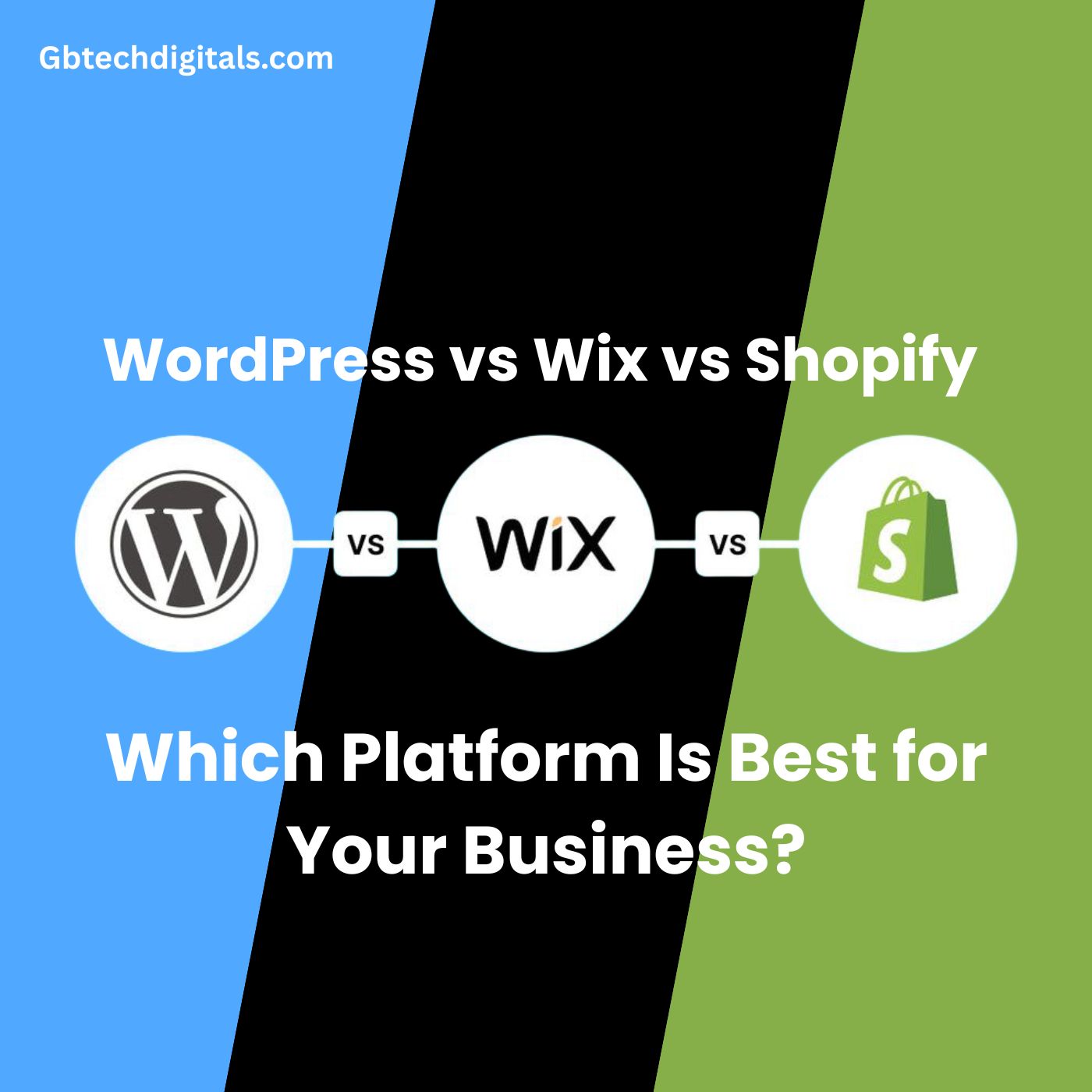
Choosing the right website platform isn’t a small decision, it’s a strategic one. The platform you build on determines how easily your business can scale, how fast your site performs, and how well your brand converts visitors into customers.
Among the top contenders, WordPress, Wix, and Shopify dominate the global market. Each offers unique strengths but also comes with trade-offs.
If you’re launching a website this year, whether it’s for an e-commerce store, a service-based business, or a personal brand, this guide breaks down each platform in terms of cost, usability, flexibility, SEO, and growth potential, so you can make an informed business decision.
1. Cost and Pricing: Understanding the Real Investment
Every platform claims to be “affordable,” but the total cost of ownership tells the real story.
WordPress
WordPress itself is free, but you’ll need hosting, a domain name, and possibly premium themes or plugins.
- Hosting: from $3 to $25/month (depending on provider and performance)
- Domain: ~$10–15/year
- Premium themes/plugins: optional but often necessary for professional results
Best for: Business owners who prefer scalability and full control over their expenses.
Wix
Wix offers all-in-one pricing with hosting, templates, and maintenance included.
- Plans: start at around $16/month for business use
- Custom domains are free for the first year
- You pay more for extra storage, apps, or e-commerce features
Best for: Entrepreneurs who want a predictable monthly fee and minimal setup complexity.
Shopify
Shopify is e-commerce-first, which means its pricing is built for sellers.
- Plans: from $29/month up to $299/month
- Additional costs: premium themes, apps, and transaction fees if you don’t use Shopify Payments
Best for: Online stores and brands focused on selling products or dropshipping.
2. Ease of Use: How Quickly Can You Build?
WordPress
Powerful but technical. You’ll have to install it on a hosting account, choose a theme (e.g., Astra, Kadence, or Elementor), and manage plugins for functionality.
- Pros: Full customization, endless options
- Cons: Requires time to learn and manage
Wix
Extremely beginner-friendly with a drag-and-drop editor and AI website builder (Wix ADI).
- Pros: No coding skills needed, intuitive design tools
- Cons: Limited flexibility once you outgrow its system
Shopify
Built for selling, not coding. Everything is streamlined—products, shipping, and checkout setup are guided by wizards.
- Pros: Fast launch, easy product management
- Cons: Less design freedom and fewer customization options compared to WordPress
Verdict:
- Beginners → Wix
- E-commerce startups → Shopify
- Experienced users or agencies → WordPress
3. Customization and Flexibility: How Much Freedom Do You Want?
WordPress
WordPress wins in flexibility, hands down. With over 59,000 free plugins and thousands of premium ones, you can create any kind of website imaginable. You control every aspect of your site: structure, SEO, design, and database.
Wix
Wix limits deep customization since it’s a closed ecosystem. You can’t access or migrate your code base easily. However, Wix offers hundreds of ready-made templates and integrations for marketing tools.
Shopify
Shopify’s App Store offers 8,000+ apps, but deeper customization requires coding in Liquid, its proprietary language.
Verdict:
- For creative freedom → WordPress
- For simplicity → Wix
- For structured e-commerce → Shopify

4. SEO and Performance: Winning the Search Battle
Search engine visibility determines whether customers find your site or your competitors.
WordPress
SEO powerhouse when configured correctly. Tools like Yoast SEO and Rank Math give you total control over titles, descriptions, schema, and XML sitemaps. Paired with good hosting, WordPress sites can achieve lightning-fast load times.
Wix
Wix has improved its SEO game, offering built-in tools like custom meta tags and 301 redirects. But performance can lag with media-heavy pages or large websites.
Shopify
Shopify includes essential SEO features, editable titles, alt text, and automatic sitemaps. However, its rigid URL structure and reliance on apps can limit advanced SEO strategies.
Verdict:
- For full SEO control → WordPress
- For built-in simplicity → Wix
- For e-commerce SEO basics → Shopify
5. Scalability and Growth: Thinking Long-Term
Your website should evolve as your business grows.
WordPress
Highly scalable from blogs to enterprise-level systems. You can migrate, expand, or host anywhere without restriction.
Wix
Scaling is limited. Once you outgrow its ecosystem or need advanced features like database integrations or complex automation, you’ll need to migrate to a different platform.
Shopify
Built for growth, especially in e-commerce. It scales effortlessly from 10 products to 10,000. However, non-ecommerce businesses may find it restrictive.
Verdict:
- Long-term scalability → WordPress
- Easy scaling for stores → Shopify
- Small websites or portfolios → Wix
6. Support and Maintenance
WordPress
Community-driven support, massive documentation, and tutorials everywhere—but you’re responsible for managing updates and security.
Wix
24/7 support, knowledge base, and automatic updates handled by Wix itself.
Shopify
24/7 live chat, email, and phone support. They handle uptime and technical maintenance for you.
Verdict:
- If you want hands-off maintenance, go with Wix or Shopify.
- If you want hands-on control, choose WordPress.
7. Comparison Snapshot
| Feature | WordPress | Wix | Shopify |
|---|---|---|---|
| Ease of Use | Moderate | Easiest | Easy |
| Customization | Unlimited | Limited | Moderate |
| E-commerce Strength | High (with plugins) | Medium | Excellent |
| SEO Capability | Advanced | Basic to Intermediate | Moderate |
| Scalability | Excellent | Limited | Excellent |
| Maintenance | Manual | Automatic | Automatic |
| Pricing Flexibility | High | Fixed plans | Tiered plans |
8. Final Verdict: Which Platform Wins?
Let’s get straight to it—no sugarcoating.
- If you want maximum freedom, scalability, and SEO power, go with WordPress.
- If you need speed, simplicity, and zero maintenance, choose Wix.
- If your focus is e-commerce, inventory, and sales, Shopify is your best bet.
There’s no “best” platform universally—there’s only the platform that best fits your business goals. The smart move is to define your needs first:
- Do you prioritize control or convenience?
- Do you want to manage everything or just focus on running your business?
Your answers will reveal your winner.
Conclusion
Your website is your digital storefront, and the foundation of your brand’s online credibility. Whether you choose WordPress for flexibility, Wix for convenience, or Shopify for selling power, what truly matters is execution: how your site looks, performs, and converts.
If you’re ready to take your business online with a professional touch, the right strategy, and a stunning UI/UX design partner with a designer who understands both the creative and technical sides of the web.
Need a professional website? Contact Oyetunji Ridwan – Web Designer & UI/UX Specialist at GbTech Digitals.




